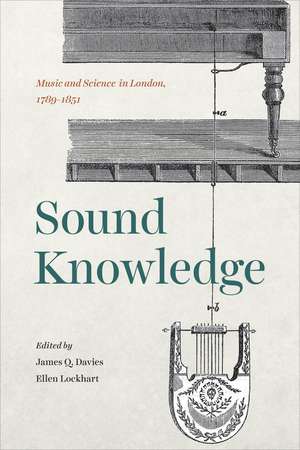Sound Knowledge: Music and Science in London, 1789-1851
Editat de J. Q. Davies, Ellen Lockharten Limba Engleză Hardback – 27 ian 2017
What does it mean to hear scientifically? What does it mean to see musically? This volume uncovers a new side to the long nineteenth century in London, a hidden history in which virtuosic musical entertainment and scientific discovery intersected in remarkable ways.
Sound Knowledge examines how scientific truth was accrued by means of visual and aural experience, and, in turn, how musical knowledge was located in relation to empirical scientific practice. James Q. Davies and Ellen Lockhart gather work by leading scholars to explore a crucial sixty-year period, beginning with Charles Burney’s ambitious General History of Music, a four-volume study of music around the globe, and extending to the Great Exhibition of 1851, where musical instruments were assembled alongside the technologies of science and industry in the immense glass-encased collections of the Crystal Palace. Importantly, as the contributions show, both the power of science and the power of music relied on performance, spectacle, and experiment. Ultimately, this volume sets the stage for a new picture of modern disciplinarity, shining light on an era before the division of aural and visual knowledge.
Sound Knowledge examines how scientific truth was accrued by means of visual and aural experience, and, in turn, how musical knowledge was located in relation to empirical scientific practice. James Q. Davies and Ellen Lockhart gather work by leading scholars to explore a crucial sixty-year period, beginning with Charles Burney’s ambitious General History of Music, a four-volume study of music around the globe, and extending to the Great Exhibition of 1851, where musical instruments were assembled alongside the technologies of science and industry in the immense glass-encased collections of the Crystal Palace. Importantly, as the contributions show, both the power of science and the power of music relied on performance, spectacle, and experiment. Ultimately, this volume sets the stage for a new picture of modern disciplinarity, shining light on an era before the division of aural and visual knowledge.
Preț: 317.82 lei
Preț vechi: 399.01 lei
-20% Nou
Puncte Express: 477
Preț estimativ în valută:
60.87€ • 62.71$ • 50.99£
60.87€ • 62.71$ • 50.99£
Carte indisponibilă temporar
Doresc să fiu notificat când acest titlu va fi disponibil:
Se trimite...
Preluare comenzi: 021 569.72.76
Specificații
ISBN-13: 9780226402079
ISBN-10: 022640207X
Pagini: 256
Ilustrații: 34 halftones, 4 line drawings, 1 table
Dimensiuni: 152 x 229 x 28 mm
Greutate: 0.51 kg
Ediția:1
Editura: University of Chicago Press
Colecția University of Chicago Press
ISBN-10: 022640207X
Pagini: 256
Ilustrații: 34 halftones, 4 line drawings, 1 table
Dimensiuni: 152 x 229 x 28 mm
Greutate: 0.51 kg
Ediția:1
Editura: University of Chicago Press
Colecția University of Chicago Press
Notă biografică
James Q. Davies is associate professor of music at the University of California, Berkeley. He is the author of Romantic Anatomies of Performance. Ellen Lockhart is assistant professor of musicology at the University of Toronto.
Cuprins
Introduction: Fantasies of Total Description
James Q. Davies and Ellen Lockhart
1. Music as an Object of Natural History
Emily I. Dolan
2. Celestial Mechanisms: Adam Walker’s Eidouranion, Celestina, and the Advancement of Knowledge
Deirdre Loughridge
3. Transparent Music and Sound-Light Analogy ca. 1800
Ellen Lockhart
4. Charles Wheatstone: Musical Instrument Making, Natural Philosophy, and Acoustics in Early-Nineteenth-Century London
Myles W. Jackson
5. Charles Wheatstone’s Enchanted Lyre and the Spectacle of Sound
Melissa Dickson
6. Instruments of Empire
James Q. Davies
7. Good Vibrations: Frankenstein on the London Stage
Sarah Hibberd
8. Engine Noise and Artificial Intelligence: Babbage’s London
Gavin Williams
9. Hearing Things: Musical Objects at the 1851 Great Exhibition
Flora Willson
Acknowledgments
Contributors
Index
James Q. Davies and Ellen Lockhart
1. Music as an Object of Natural History
Emily I. Dolan
2. Celestial Mechanisms: Adam Walker’s Eidouranion, Celestina, and the Advancement of Knowledge
Deirdre Loughridge
3. Transparent Music and Sound-Light Analogy ca. 1800
Ellen Lockhart
4. Charles Wheatstone: Musical Instrument Making, Natural Philosophy, and Acoustics in Early-Nineteenth-Century London
Myles W. Jackson
5. Charles Wheatstone’s Enchanted Lyre and the Spectacle of Sound
Melissa Dickson
6. Instruments of Empire
James Q. Davies
7. Good Vibrations: Frankenstein on the London Stage
Sarah Hibberd
8. Engine Noise and Artificial Intelligence: Babbage’s London
Gavin Williams
9. Hearing Things: Musical Objects at the 1851 Great Exhibition
Flora Willson
Acknowledgments
Contributors
Index
Recenzii
“Sound Knowledge is admirably interdisciplinary, combining more traditional musicological perspectives with cultural studies, sound studies, and the history of science. The collection engages with a number of important issues—such as the period’s sometimes bizarre clashes between aesthetic and scientific concerns, and the ways sight and sound were imbricated in the production of knowledge. This book will appeal to a number of different audiences, from Victorianists and musicologists to readers interested in arcane technologies and Anglophiles eager to learn more about London’s rich musical and scientific life.”
“This exhilarating volume illuminates London’s centrality in the history of nineteenth-century music through an investigation of music’s centrality in the history of nineteenth-century science. Davies, Lockhart, and their contributors offer compelling insights into the intersections of aural and visual realms, popular experiments and theatrical performances, and musical and scientific instruments in a way that both defamiliarizes the period while offering a novel account of how music was understood at the time.”
“The book valuably picks up on recent work on the history of soundscapes, on scientific exhibitions and lectures, and on the sites of metropolitan knowledge production and consumption and connects them in ways that it would be hard not to find stimulating. . . . Clearly written and thoroughly documented.”
